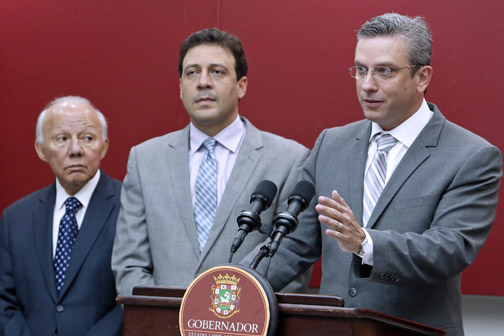Politicians, analysts, creditors react to gov’t debt default


From left: Justice Secretary César Miranda and Secretary of State Víctor Suárez flank Gov. García-Padilla during a news conference Monday morning.
The Puerto Rico government’s decision to default on a portion of the $470 million in debt service payments due Monday drew reactions from politicians, analysts and creditors alike, who both urged Congress to act on the Commonwealth’s behalf and predicted long court battles ahead.
“Puerto Rico’s failure to pay will likely elicit litigation from others, leading to protracted court battles, in the absence of a clear legal restructuring framework. Puerto Rico faces further potential defaults on July 1, when the government and its entities face almost $2 billion of debt service,” said Ted Hampton, vice president and senior credit officer at Moody’s Investors Service.
“The likely pressure from creditor litigation will increase dramatically over this period, although the federal government is debating legislation to intervene in the restructuring process,” he said.
On Monday, the government defaulted on approximately 95 percent of the scheduled May 1 debt service due on notes sold by the Government Development Bank for Puerto Rico. The default expanded the range of Puerto Rico securities to include an important arm of the central government.
The GDB faced $423 million of principal and interest, of which it only paid $23 million of interest that was due. The bank reached an agreement with a subset of investors, representing about $900 million its $3.9 billion of outstanding securities, agreed to refrain from litigation under the terms of a debt-exchange proposal that hinges on Congressional action taking place in the next 30 days to keep from unraveling, GDB President Melba Acosta said during a news conference at La Fortaleza.
The government also paid another $50 million due from six public credit-issuing entities, including the Children’s Trust, among others.
Following the admission of the partial payment, Puerto Rico’s Resident Commissioner in Washington predicted that further defaults would be “devastating to Puerto Rico’s economy,” calling on Congress to act.
“To alleviate the crisis, Congress must enact bipartisan and balanced legislation that, on the one hand, empowers Puerto Rico to restructure its debts in a fair and orderly manner and, on the other hand, establishes an independent, federally-appointed and temporary oversight board to help the Puerto Rico government better manage its finances and to play a role in the debt restructuring process,” he said.
“The restructuring authority should be applicable to all financially-distressed debt-issuing entities in Puerto Rico, but should respect the relative rights and priorities that the creditors of such entities have under Puerto Rico law. The oversight board should respect the democratic process in Puerto Rico, but must have teeth to be effective,” Pierluisi added.
In addressing reporters, Gov. Alejandro García-Padilla said Monday the decision to default on part of the debt due “was difficult and sad for me. I wanted to be a governor who also completed big projects. Instead, I have to be the governor who addresses the fiscal crisis.”
Aware of the potential avalanche of lawsuits ahead, García-Padilla said the worrisome aspect will be the consequences of those litigations in the hands of local and stateside judges.
“Congress has to act. If it doesn’t we’ll be at the mercy of a voluntary negotiation, which promises to be drawn-out,” he said.
Meanwhile, Rep. Nydia M. Velázquez (D-NY), said Monday’s “unfortunate news only underscores the need for Congress to act swiftly. The Puerto Rico financial crisis is rapidly becoming a humanitarian crisis and this most recent default is only the tip of the iceberg. We need to quickly enact legislation that allows for meaningful restructuring of Puerto Rico’s debts before the situation deteriorates further.”
A group of Sales Tax Financing Corp. Senior Bondholders seemed to agree, saying “without the legal framework and restructuring tools required to address this debt crisis, Puerto Rico’s leaders will continue making decisions out of desperation.”
García-Padilla’s executive order to default on nearly $370 million in bond payments should underscore for Congress that the cost of political inaction is rising and reinvigorate members’ efforts to pass the Puerto Rico Oversight, Management, and Economic Stability Act, said former Senator Judd Gregg (R-NH), an advisor to the COFINA Senior Bondholders Ad Hoc Group in a written statement.
“Although the suspension of payments by the GDB does not impact COFINA’s creditors, our group wants to reiterate its support for pragmatic legislation that helps overhaul the Commonwealth’s obligations, reignite on-island growth and shield U.S. taxpayers from funding a bailout,” he said, on behalf of the coalition of creditors made up of retirees and individual investors in Puerto Rico and throughout the United States, as well as asset managers GoldenTree Asset Management LP, Merced Capital LP, Tilden Park Capital Management, Whitebox Advisors LLC, and others.
“We ask all external stakeholders to join us in helping the Committee finalize a bill that treats bondholders equitably and fairly based on their legal rights. Now is the time for responsible action — otherwise U.S. taxpayers as well as the Puerto Rican people will be at risk,” said Gregg, who served as a U.S. Senator from 1993 to 2011 and was Chairman and Ranking Member of the Senate Budget Committee and also Chairman and ranking member of the Health, Education, Labor and Pension Committee.












